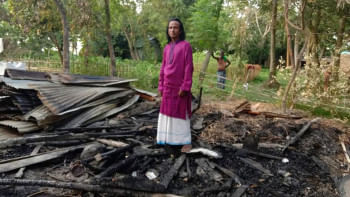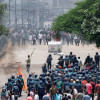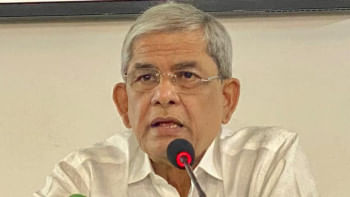Silencing the critic: The cost of stifling voices in the name of authority

Shamim Ashraf, a poet and graphic artist from Mymensingh known for his visually compelling artworks, has found himself embroiled in a conflict that transcends the personal sphere, entering political discourse and putting into question citizens' right to free speech. The nature of his dispute with Md Ekramul Haque Titu, Mymensingh city's former mayor, remains shrouded in ambiguity. Yet, what is clear is Shamim's unwavering commitment to critiquing the operations of the relevant city corporation—a mission he took on not as a detractor but as a vigilant citizen deeply invested in the welfare of his community. Notably, Titu is also the president of the Mymensingh Metropolitan Awami League and a candidate in the city election scheduled on March 9.
Through his posters, Shamim voiced concerns about the Mymensingh City Corporation's seemingly unchecked authority. This led to his arrest under the contentious Section 54 of The Code of Criminal Procedure, 1898 under which a person against whom a reasonable suspicion exists can be arrested without a warrant or an order from a magistrate. The allegation against Shamim was that, through his poster designs, he has conducted a smear campaign against the MCC and the city's recent former mayor Md Ekramul Haque Titu.
The imagery of Shamim speaking from within a prison van, lamenting the loss of his children's right to gaze upon the sky, and the drying up of the Brahmaputra, is poignant and heartrending. His words, "I speak for the people of my region. I speak in poetry. I speak in the voice of beauty. This is my crime," resonate with the power of truth spoken to authority.
The story does not conclude with his arrest. Shamim was released on bail on the afternoon of February 20, after being arrested from his office on the night of February 18. But despite being granted bail by Senior Judicial Magistrate Md Tajul Islam Sohag, the saga continued as the MCC (through administrative officer Kanchan Kumar Nandi) pursued further legal action against Shamim at the Mymensingh Cyber Tribunal on February 20. This relentless pursuit sends a chilling message: criticism of authority will not be tolerated.
Yet, reflecting on our history, the monumental role of Quamrul Hassan's "Ei janowarder hottya korte hobe" ("Annihilate these demons") poster cannot be overstated. This iconic artwork, portraying Yahya Khan as a malevolent figure, became a powerful emblem of resistance and played a pivotal role in garnering international attention to the genocide occurring in Bangladesh during its liberation struggle. But it also begs the question: would we, in today's Bangladesh, have subjected Quamrul Hassan to imprisonment for employing his art to critique the current political culture?
The act of vocal criticism runs deep in our veins and is testament to our forebears who fearlessly raised their voices against tyranny, risking everything for the sake of future generations. Their battles were against a foreign oppressor and were aimed at forging a distinct national identity. The irony in the contemporary landscape is that, despite living under the banner of a "free" state, expressing dissent—even against glaring issues like dilapidated roads, inadequate drainage systems, or the absence of essential public amenities—can potentially endanger one's life.
The stark contrast between our foundational principles and current realities raises a critical question: why does the act of pointing out observable flaws in the work of the government, an act intrinsic to the very DNA of our nationhood, place us in the line of fire? It's a reflection that demands not just contemplation but a collective reevaluation of our commitment to the freedoms which our ancestors fought so valiantly to secure.
Lawyers and human rights activists have rightly identified Shamim Ashraf's ordeal as a stark violation of human rights, signalling a dangerous precedent where the act of criticism becomes an act punishable by law. The response to Shamim's arrest—from the human chains formed by cultural activists to netizens' outcry on social media—showcases the community's resilience and the universal value of free speech. But the very need for such protests highlights the fragility of our rights in the face of oppressive laws.
Global Human Rights Defender Award winner Nur Khan Liton's commentary on the use of cybersecurity laws to hinder free speech hints to a systematic approach to suppress any form of dissent, thereby eroding the foundation of democracy and human rights. Liton mentions that the town of Evansburg in Alberta, Canada has taken a novel approach to embrace criticism by appointing an official "Town Grouch." This role, dedicated to voicing complaints, criticisms, and accusations, embodies the democratic principle that opposing views are essential for societal growth. By formalising dissent via the establishment of this position, Evansburg highlights the importance of contrarian perspectives in fostering dialogue, uncovering issues, and stimulating change. Evansburg's unique initiative serves as a reminder of the value of criticism in enhancing transparency, accountability, and community engagement, thus offering a model for how societies can constructively engage with dissenting voices to promote collective improvement.
For the citizens of Bangladesh, the ordeal faced by Shamim Ashraf should be a wake-up call. It underscores the urgent need for vigilance and resistance against any form of censorship. If authorities continue down their current path, they risk creating a society where silence is the norm, and the ability to critique is an anomaly. This is not just about one individual's right to speak; it's about preserving the collective soul of our society.
Salman Rushdie holds the conviction that true freedom of thought is at risk when subjects or ideas are placed beyond the realms of criticism, satire, ridicule, or contempt. We must be able to challenge, question, and even mock ideas to ensure a vibrant and free exchange of thoughts.
If any thought, idea, or state activity cannot be purified through criticism, then the light of progress is blocked. The question for authorities now is: in this era of unquestioning, criticism-free, and continuous praise and obedience, are we walking down the path towards another dark age?
Mamunur Rashid is a journalist at the Daily Star.
Nazifa Raidah is a member of the editorial team at The Daily Star. Reach her at [email protected]
Views expressed in this article are the author's own.
Follow The Daily Star Opinion on Facebook for the latest opinions, commentaries and analyses by experts and professionals. To contribute your article or letter to The Daily Star Opinion, see our guidelines for submission.



 For all latest news, follow The Daily Star's Google News channel.
For all latest news, follow The Daily Star's Google News channel. 










Comments